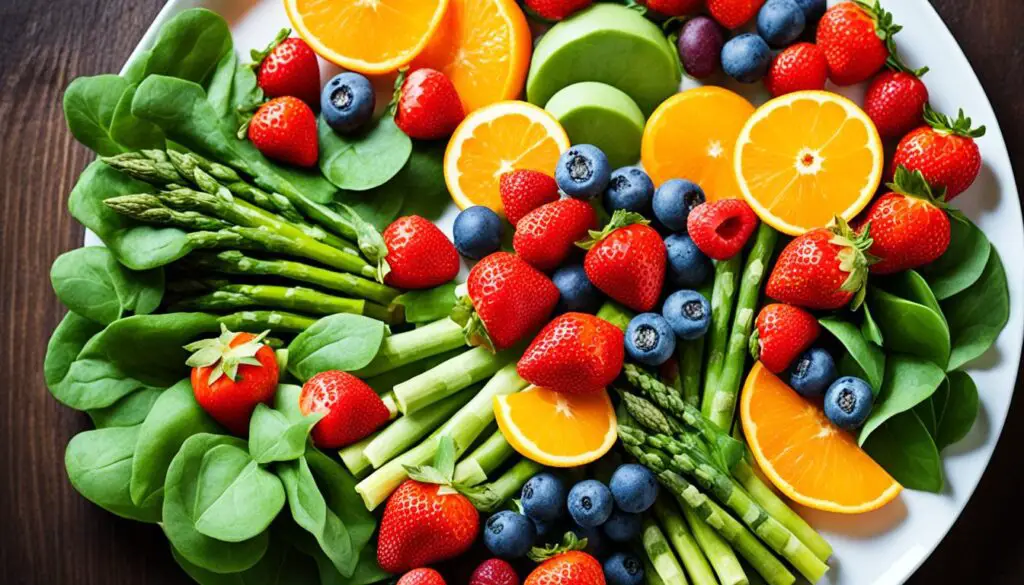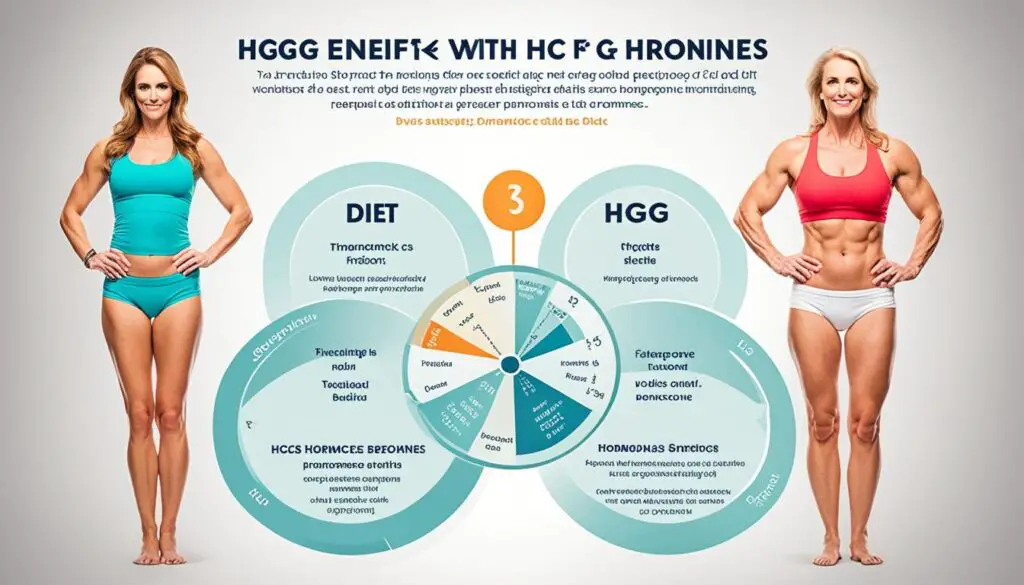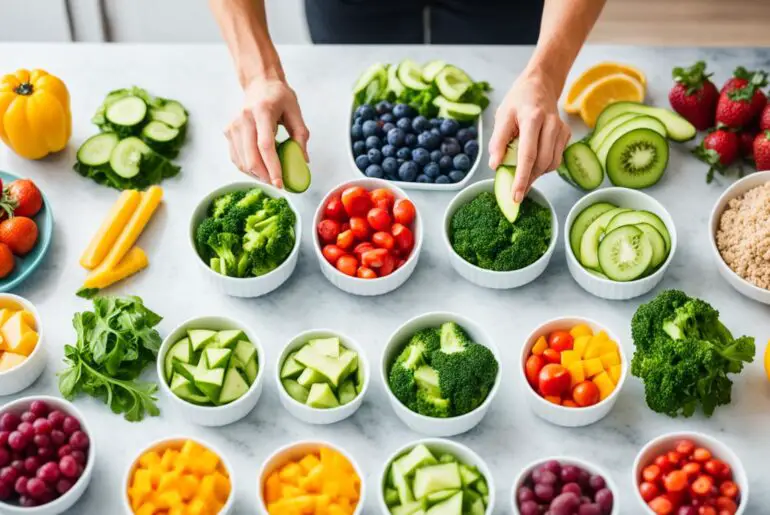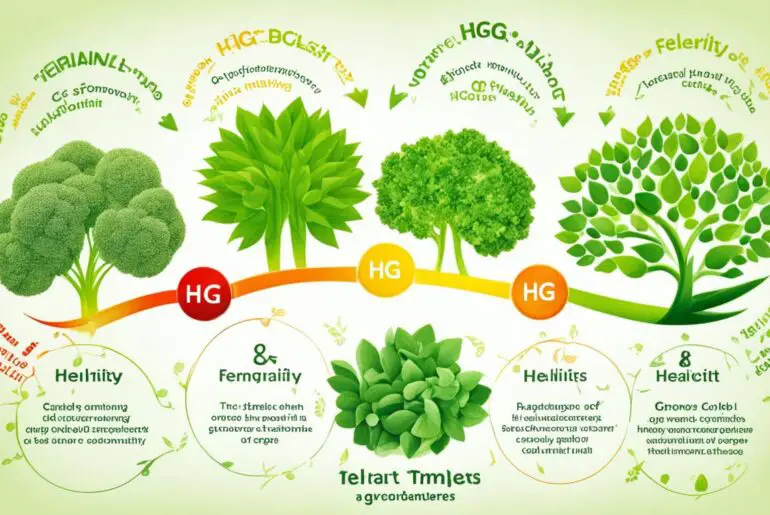Are you struggling to lose weight and achieve hormone balance? Have you heard of the HCG diet plan? But is it safe and effective? In this article, I will explore the controversial world of the HCG diet and separate fact from fiction. Join me as we delve into the science, potential risks, and alternative options for achieving weight loss and hormone balance.
Key Takeaways:
- The HCG diet involves the use of human chorionic gonadotropin (HCG) hormone to aid in weight loss.
- The FDA advises against using HCG for weight loss as it has not been proven effective and can have potential risks and side effects.
- Severely restricting calories, as recommended in the HCG diet, can lead to short-term weight loss but also carries risks such as nutrient deficiencies and gallstone formation.
- There are safer and more effective ways to achieve weight loss and hormone balance, such as following a balanced diet, exercising regularly, and working with a healthcare professional.
- Consult with a healthcare provider before starting any diet plan or considering the HCG diet.
What is HCG and how does it work?
HCG, or human chorionic gonadotropin, is a hormone produced during pregnancy. It serves as a marker in pregnancy tests and can also be used to treat fertility issues. The HCG diet combines the use of HCG hormone supplements or injections with an extremely low-calorie diet. While the diet claims that HCG promotes weight loss, studies have shown that the primary factor contributing to weight loss on the HCG diet is the severe calorie restriction rather than the effects of the HCG hormone itself.
The HCG hormone diet plan involves consuming HCG supplements or injections alongside a highly restrictive calorie intake. Supporters of the diet claim that HCG helps suppress appetite and redistributes fat stores, leading to rapid weight loss.
“The weight loss achieved on the HCG diet is primarily due to calorie restriction rather than the effects of the HCG hormone.”
However, scientific evidence does not support these claims. Studies have consistently found that the weight loss experienced on the HCG diet is primarily due to the severe caloric restriction rather than any specific effect of the HCG hormone.
Is the HCG diet safe and effective?

The HCG diet, also known as the HCG hormone diet, has gained popularity as a weight loss method. However, it is essential to evaluate its safety and effectiveness before considering this diet plan.
The HCG diet has not been proven to be safe or effective for weight loss. The U.S. Food and Drug Administration (FDA) has issued warnings against the use of HCG products for weight loss purposes, as they are not approved for this specific use. Furthermore, the severe calorie restriction that is recommended in the HCG diet can lead to nutritional deficiencies, gallstone formation, and other potential health complications.
Instead of relying on the HCG diet, there are safer and more effective options to achieve weight loss and hormone balance. A balanced diet that includes a variety of nutrient-dense foods, regular exercise, and guidance from a healthcare professional can help achieve sustainable weight loss and overall health. It is important to prioritize the well-being and safety of individuals when considering any diet plan.
“It is essential to evaluate the safety and effectiveness of the HCG diet before considering this weight loss method.”
| Risks of the HCG Diet | Side Effects of the HCG Diet |
|---|---|
| 1. Nutritional deficiencies | 1. Fatigue |
| 2. Gallstone formation | 2. Irritability |
| 3. Potential hormonal imbalances | 3. Restlessness |
| 4. Increased risk of certain cancers | 4. Depression |
| 5. Fluid buildup | |
| 6. Breast swelling in males | |
| 7. Blood clot formation |
It is crucial to consult with a healthcare professional before embarking on any weight loss journey or hormone balance meal plan. They can provide personalized guidance, consider individual health factors, and help individuals develop a sustainable and effective approach to weight loss and hormone balance.
“Consulting a healthcare professional is crucial before starting any weight loss plan or hormone balancing diet.”
The three phases of the HCG diet
The HCG diet is a structured plan that consists of three distinct phases, each serving a specific purpose in achieving weight loss and hormone balance. These phases are:
Loading Phase
This phase marks the beginning of the HCG diet and typically lasts for two days. During this phase, individuals consume high-fat, high-calorie foods to help prepare their bodies for the subsequent phases. The purpose of this phase is to build up the body’s fat reserves and facilitate the metabolic processes that will aid in weight loss later on.
Weight Loss Phase
The weight loss phase is the most intensive part of the HCG diet and generally lasts for a period of three to six weeks. During this phase, individuals follow an extremely low-calorie diet, typically consisting of 500 to 800 calories per day. This low-calorie intake, combined with the use of HCG supplements or injections, triggers the body to tap into its stored fat reserves for energy. This phase is crucial for significant weight loss and metabolic reset.
Maintenance Phase
The maintenance phase follows the weight loss phase and focuses on gradually reintroducing foods while maintaining the results achieved during the diet. The duration of this phase can vary, but it typically lasts for three weeks. During this phase, individuals increase their food intake while avoiding sugar and starch. The purpose of this phase is to stabilize the weight loss and establish new eating habits that promote long-term weight management and hormone balance.
Throughout the three phases, it is important to follow the HCG diet protocol and adhere to the recommended guidelines for optimal results.
| Phase | Description |
|---|---|
| Loading Phase | Consuming high-fat, high-calorie foods to build up fat reserves |
| Weight Loss Phase | Following an extremely low-calorie diet and using HCG supplements or injections to trigger fat burning |
| Maintenance Phase | Gradually increasing food intake while avoiding sugar and starch to stabilize weight loss |
Foods allowed on the HCG diet

The HCG diet, known for its role in hormone balance, allows for specific foods during the weight loss phase. These foods are carefully chosen to support the diet’s objectives and provide necessary nutrients. By following a proper meal plan and consulting with a healthcare provider, individuals can ensure that their nutritional needs are met while adhering to the HCG diet.
Approved foods on the HCG diet include lean proteins like chicken, fish, and lean beef. These protein sources are essential for maintaining muscle mass while losing weight. Additionally, certain vegetables such as spinach, cabbage, and tomatoes are permitted. These vegetables offer vitamins, minerals, and fiber without excessive calories that can hinder weight loss.
Incorporating fruits into the diet is also allowed, albeit in limited quantities. Berries, citrus fruits, and apples are among the approved fruits on the HCG diet. These fruits offer a natural sweetness and a range of vitamins and antioxidants while being mindful of sugar intake.
The HCG diet imposes restrictions on certain food groups to maximize weight loss and hormone balance. Dairy products, high-carb foods, fats and oils, and sugary foods and desserts are not permitted on the diet. By avoiding these foods, individuals can reduce calorie intake and optimize the metabolic effects of the HCG hormone.
It is important to note that while the HCG diet offers a specific list of allowed foods, it is always recommended to consult with a healthcare provider or registered dietitian to ensure adequate nutrition and overall well-being.
To summarize, the foods allowed on the HCG diet for hormone balance and weight loss include:
- Lean proteins: chicken, fish, lean beef
- Vegetables: spinach, cabbage, tomatoes
- Fruits: berries, citrus fruits, apples
“The HCG diet carefully selects foods that support hormone balance and weight loss.” – Your Healthcare Provider
Foods Allowed on the HCG Diet
| Food Group | Examples |
|---|---|
| Lean Proteins | Chicken, Fish, Lean Beef |
| Vegetables | Spinach, Cabbage, Tomatoes |
| Fruits | Berries, Citrus Fruits, Apples |
Scam products and safety concerns
When it comes to the HCG Diet Plan for Hormone Balance and HCG hormone weight loss, it’s important to be aware of the prevalence of scam products in the market. Many products claim to be HCG supplements or injections for weight loss, but they are often deceptive and unsafe.
The United States Food and Drug Administration (FDA) has issued warnings about the safety and effectiveness of over-the-counter HCG products for weight loss. Selling such products for weight loss purposes is illegal in the United States. Legitimate HCG products are only available by prescription for specific medical conditions.
The HCG diet itself is considered unsafe and unhealthy. Severe calorie restriction, as recommended in the HCG diet, can lead to various side effects such as headaches, fatigue, depression, and blood clotting issues. It is essential to consult with a healthcare professional before considering any HCG products or diet plans to ensure your safety and well-being.
Be cautious and skeptical of any products claiming to be HCG supplements or injections for weight loss. Always do thorough research and consult with a healthcare professional to make informed decisions about your health and weight loss journey.
Note: The image above is an illustration and does not depict any specific HCG product or brand.
Alternative weight loss options

While the HCG diet may have gained popularity for its promises of quick weight loss and hormone balance, it is important to explore alternative options that prioritize safety, effectiveness, and long-term success. Rather than relying on fad diets or questionable products, consider adopting a holistic approach to weight loss and hormone balance.
1. Balanced Diet with Nutrient-Dense Foods
Achieving weight loss and hormone balance begins with nourishing your body with whole, nutrient-dense foods. Focus on consuming lean proteins, such as chicken, fish, and lean beef, as well as a variety of vegetables like spinach, cabbage, and tomatoes. Incorporate fruits like berries, citrus fruits, and apples in moderation. By fueling your body with wholesome ingredients, you provide the necessary nutrients for optimal health and hormone regulation.
2. Regular Physical Activity
Maintaining an active lifestyle is crucial for weight loss and overall well-being. Engage in regular physical activity, including cardiovascular exercises, strength training, and flexibility exercises. Find activities that you enjoy and make them a part of your daily routine. Not only will exercise help you burn calories, but it will also support healthy hormone production and balance.
3. Stress Management
Chronic stress can disrupt hormone balance and contribute to weight gain. Incorporate stress management techniques into your daily routine, such as meditation, deep breathing exercises, yoga, or engaging in hobbies that bring you joy. Taking time to relax and unwind can help alleviate stress and promote hormone balance.
4. Quality Sleep
Sleep plays a vital role in hormone regulation and weight management. Aim for 7-9 hours of quality sleep each night to ensure your body has adequate time to repair and restore. Practice good sleep hygiene by establishing a consistent sleep schedule, avoiding electronic devices before bed, and creating a sleep-friendly environment.
5. Work with a Healthcare Professional
Addressing underlying hormonal imbalances requires the expertise of a healthcare professional. Consult with a healthcare provider who specializes in hormone balance to develop a personalized meal plan, exercise regimen, and explore potential treatment options. A tailored approach will ensure that you receive proper guidance and support throughout your weight loss and hormone balance journey.
By implementing these alternative weight loss options, you can achieve sustainable results and maintain optimal hormone balance. Remember, true health and well-being come from making long-term lifestyle changes rather than relying on quick-fix diets or unproven methods.
| Alternative Weight Loss Options | Description |
|---|---|
| Balanced Diet with Nutrient-Dense Foods | Prioritize whole, nutrient-dense foods for optimal health and hormone balance. |
| Regular Physical Activity | Engage in regular exercise to support weight loss and hormone regulation. |
| Stress Management | Implement stress management techniques to support healthy hormone balance. |
| Quality Sleep | Aim for sufficient sleep to promote proper hormone production and regulation. |
| Work with a Healthcare Professional | Consult with a healthcare provider to develop a personalized plan for hormone balance. |
Potential risks and side effects of the HCG diet

The HCG diet, despite its popularity, comes with several potential risks and side effects that individuals should be aware of before considering this weight loss plan. These risks include:
- Nutrient deficiencies: The severe calorie restriction of the HCG diet, combined with limited food choices, can lead to deficiencies in essential nutrients such as vitamins, minerals, and proteins. This can have negative impacts on overall health and well-being.
- Gallstone formation: Rapid weight loss, as achieved through the HCG diet, increases the risk of gallstone formation. Gallstones can cause severe pain and may require medical intervention.
- Irregular heartbeat: Severe calorie restriction can disrupt the normal rhythm of the heart and lead to irregular heartbeats or palpitations. This can be dangerous, especially for individuals with existing heart conditions.
- Electrolyte imbalances: The HCG diet can disrupt the balance of electrolytes in the body, leading to symptoms such as muscle cramps, dizziness, and even seizures.
- Hormonal imbalances: The use of HCG hormone supplements or injections may interfere with the body’s natural hormone balance. This can result in various hormonal imbalances, which can have far-reaching effects on overall health.
- Contribution to certain types of cancers: Some studies suggest that the HCG diet may stimulate the growth of certain types of cancers, particularly hormone-sensitive cancers like breast or prostate cancer. Further research is needed to fully understand this relationship.
Common side effects reported by individuals following the HCG diet include fatigue, irritability, restlessness, depression, fluid buildup, and breast swelling in males. Additionally, there is a risk of blood clots forming and blocking blood vessels, which can be life-threatening. It is crucial to prioritize safety and consult with a healthcare professional before considering the HCG diet.
| Side Effects | Risks |
|---|---|
| 1. Nutrient deficiencies | 1. Gallstone formation |
| 2. Irregular heartbeat | 2. Electrolyte imbalances |
| 3. Hormonal imbalances | 3. Contribution to certain types of cancers |
| 4. Common side effects | 4. Risk of blood clots formation |
Conclusion
The HCG diet, which combines severe calorie restriction with the use of HCG hormone supplements or injections, is a controversial weight loss plan. However, it lacks scientific evidence to support its effectiveness and safety, as advised by the FDA. The potential risks and side effects associated with the HCG diet cannot be overlooked.
Instead of resorting to the HCG diet, individuals seeking weight loss and hormone balance should prioritize overall health and well-being. It is recommended to work with a healthcare professional to develop a personalized plan that includes a hormone balance diet and lifestyle modifications, like regular exercise and stress management.
There are safer and more sustainable ways to achieve weight loss and hormone balance without subjecting the body to extreme calorie restriction and potential risks. By focusing on a hormone balance diet and adopting healthy habits, individuals can achieve their weight loss goals while safeguarding their well-being in the long term.
FAQ
What is the HCG diet and how does it work?
The HCG diet involves the use of human chorionic gonadotropin (HCG), a hormone produced during pregnancy, to aid in weight loss. However, the FDA advises against using HCG for weight loss as it has not been proven effective and can have potential risks and side effects. Severely restricting calories, as recommended in the HCG diet, can lead to short-term weight loss but also carries risks such as nutrient deficiencies and gallstone formation. It is important to consult with a healthcare provider before starting any diet plan.
Is the HCG diet safe and effective?
The HCG diet has not been proven to be safe or effective for weight loss. The FDA has warned against the use of HCG products for weight loss, as they are not approved for this purpose and can have potential risks and side effects. The severe calorie restriction recommended in the HCG diet can lead to nutrient deficiencies, gallstone formation, and other health complications. Safer and more effective ways to achieve weight loss and hormone balance include a balanced diet, regular exercise, and working with a healthcare professional.
What are the three phases of the HCG diet?
The HCG diet is typically divided into three phases: the loading phase, the weight loss phase, and the maintenance phase. During the loading phase, individuals consume high-fat, high-calorie foods while taking HCG supplements or receiving HCG injections. The weight loss phase involves an extremely low-calorie diet of 500 to 800 calories per day, along with continued use of HCG supplements or injections. The maintenance phase focuses on gradually increasing food intake while avoiding sugar and starch for a certain period of time.
What foods are allowed on the HCG diet?
The HCG diet allows for specific foods during the weight loss phase. Approved foods include lean proteins such as chicken, fish, and lean beef, as well as certain vegetables like spinach, cabbage, and tomatoes. Fruits such as berries, citrus fruits, and apples are also permitted in limited quantities. The diet restricts dairy products, high-carb foods, fats and oils, and sugary foods and desserts. It is important to follow a proper meal plan and consult with a healthcare provider to ensure nutritional needs are met while adhering to the HCG diet.
Are there any scam products or safety concerns with the HCG diet?
There are many scam products on the market claiming to be HCG supplements or injections for weight loss. It is illegal to sell over-the-counter HCG products for weight loss in the United States, and the FDA has issued warnings about their safety and effectiveness. Legitimate HCG products are available only by prescription for specific medical conditions. The HCG diet itself is considered unsafe and unhealthy, with potential side effects including headaches, fatigue, depression, and blood clotting issues. It is important to consult with a healthcare professional before considering any HCG products or diet plans.
What are some alternative weight loss options?
Instead of the HCG diet, there are safer and more effective ways to achieve weight loss and hormone balance. These can include following a balanced diet that focuses on whole, nutrient-dense foods, engaging in regular physical activity, managing stress levels, getting enough sleep, and working with a healthcare professional to address any underlying hormonal imbalances. It is important to prioritize overall health and well-being rather than relying on quick-fix diets or products that may have potential risks and limited long-term success.
What are the potential risks and side effects of the HCG diet?
The HCG diet can have various risks and side effects, including nutrient deficiencies, gallstone formation, irregular heartbeat, and electrolyte imbalances. It may also lead to hormonal imbalances and contribute to the growth of certain types of cancers. Common side effects reported with the HCG diet include fatigue, irritability, restlessness, depression, fluid buildup, and breast swelling in males. There is also a risk of blood clots forming and blocking blood vessels. It is essential to prioritize safety and consult with a healthcare professional before considering the HCG diet.




